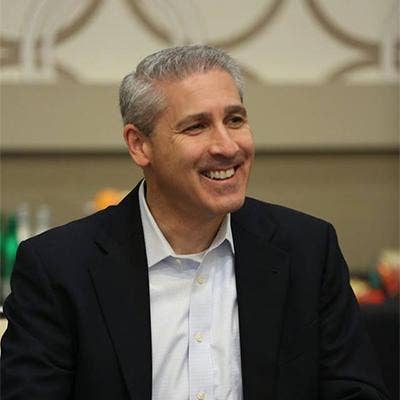CRN Cloud Services Roundtable: Where Is The Biggest Cloud Opportunity For Solution Providers?

Channel Chiefs Converse On Cloud
With strategic service providers stepping up to act as independent trusted technology cloud consultants driving business outcomes, CRN asked four top channel executives from Microsoft, EMC-Virtustream, Hewlett Packard Enterprise and NetSuite to weigh in on a wide variety of cloud issues including the cloud services opportunity, the need for partners to attain new skills and DevOps competency, to Amazon Web Services.
The four channel chiefs -- Microsoft Corporate Vice President Phil Sorgen, HPE Cloud Chief Marketing Officer Bobby Patrick, NetSuite Senior Vice President, Channel Sales Craig West, and Vice President, Channels EMC-Virtustream Sean McGinn -- also spoke about their respective company cloud strategies and the future of the channel.
The discussion took place as CRN parent The Channel Company released exclusive research showing that strategic service providers, which are driving a higher percentage of sales based on solving business problems, have $1 million more in annual revenue and nearly double the percentage of cloud and managed services sales than solution providers that have not moved to the new business model.
Following is a description of each executive's role and background, as well as how they in their own words view the cloud opportunity.

Microsoft Corporate Vice President Phil Sorgen
Microsoft Corporate Vice President Phil Sorgen, No. 17 on CRN's Top 25 Channel Sales leader list, was one of the driving forces behind Microsoft's successful Cloud Solution Provider program.
The acclaimed program, which has given Microsoft partners control over provisioning, billing, managing and supporting customer cloud subscription, now has 2,000 partners.
Sorgen also played a critical role in Office 365 and Microsoft Azure open licensing, and new cloud competencies around platforms, productivity, and small and midmarket solutions.
The 16-year Microsoft veteran, who has led the worldwide partner organization for the past three years, has an MBA from the University of North Texas.

HPE Cloud Chief Marketing Officer Bobby Patrick
HPE Cloud Chief Marketing Officer Bobby Patrick is one of the leaders in Hewlett Packard Enterprise's $3 billion Helion hybrid cloud organization.
Patrick, who joined the company two years ago, pioneered the managed hosting concept as the CMO of Internet service provider Digex, which under his seven-year tenure grew from just a $2 million business to $220 million.
Patrick was also the key architect behind the world's largest data integration cloud, the GXS Trading Grid, a hosted cloud based B2B integration platform.
Patrick started his IT career working for the FBI at just 16 years old. He received his bachelor's degree in MIS and decision systems from George Mason University while working full time as a computer specialist for the FBI.

NetSuite Senior Vice President Channel Sales Craig West
Craig West, a 13-year NetSuite veteran, has built what may well be the top recurring revenue solution provider network in the channel.
Under West's leadership, NetSuite has consistently received rave reviews from partners for its whopping 30 percent ERP Software-as-a-Service sales commission model.
One sign of the success of NetSuite's channel prowess: an increasing number of partners that were selling competitive offerings jumping on board the NetSuite bandwagon.
West, a business management graduate of Virginia Tech, says the company's partners continue to inspire him and the NetSuite channel team. "Their passion pushes us to continue to lead the industry and innovate, providing the products, tools and resources that can ensure their success," he said.

Vice President Channels EMC-Virtustream Sean McGinn
Vice President Channels EMC-Virtustream Sean McGinn is leading the channel build-out for what has quickly become one of the most respected enterprise public clouds.
EMC last July paid a whopping $1.2 billion for Virtustream, considered the gold standard for SAP cloud services, and the business has been highlighted as a high-growth business for the blockbuster EMC-Dell merger.
McGinn joined Virtustream last July after seven years at SAP including nearly four years as senior director of business development for the SAP HANA Cloud Group. At SAP, McGinn co-developed the plan for the launch of the SAP HANA Enterprise Cloud.
McGinn, who has a bachelor's degree from Carnegie Mellon University and a degree in international business from Tufts University, was a captain and platoon leader in the U.S. Army Intelligence branch in Korea.

Microsoft's Sorgen
The opportunity truly spans from small business, all the way to enterprise. Yet, the reason enterprises are evaluating cloud, and depending on other companies to help them get there, is different than the reason small businesses are thinking about cloud as a capability.
For a small business, it democratizes IT. It's giving them access to capabilities they historically didn't even have the capacity internally, or potentially the dollars to invest in, getting that kind of capability. It's a whole different set of reasons for enterprise, but they're both moving in a fairly significant pace. As a matter of fact, our research for the cloud industry over the next three years [shows] it's going to continue to grow at six times the rest of IT.
There's an opportunity for our partners collectively to be successful. You have to apply the right business model, the right sales model, the right servicing model, but there's a true opportunity from small business all the way to enterprise. They're all accelerating.

HPE's Patrick
We believe that every customer has their own right mix of traditional IT, private-managed, and public clouds. As you know, 70 percent of our business runs through the channel. Helping our channel be able to make this transformational connection, and to understand this right mix, is critical.
Our research shows that 74 percent of all workloads in the next two years are going to private clouds. Cloud is not just AWS. It actually is a variety of deployment platforms, and I think it's that right mix that matters. Our goal is to help every channel partner be able to capitalize on that, assess the workloads, define where they should go, deploy private clouds. There is a big services business right now not just deploying, but managing and maintaining these new private clouds. Helping them, because it's a multi-cloud world, manage multiple clouds, provide some kind of monitoring and management of costs. Then, in the case of public clouds, helping manage and monitor workloads that make sense there.

NetSuite's West
We're 100 percent SaaS. We're 100 percent business apps. For us, the lens we look at is a little bit more narrow. We started as a very low-end competitor and really have set our sights on the midmarket. From a readiness standpoint, we see midmarket consumption as high as it's ever been. We see readiness as high as it's ever been. A lot of that's driven by the readiness of the solution provider community, because those communities continue to be trusted advisers. For us, they're the implementers. These aren't systems that stand themselves up. We need those business consultants to drive those implementations.

EMC-Virtustream's McGinn
For Virtustream, we're seeing just tremendous growth in the large enterprise, mission-critical I/O-intensive application space. We're almost singly focused as well, in terms of that space, with the way we've architected our Infrastructure-as-a-Service model to serve that customer community. As an EMC Federation company now, we're really seeing the growth opportunity as well, in the public and private on-prem, off-prem, hybrid cloud deployment models. With XtremeIO as our cloud management platform, we're able to manage those different environments very dynamically.
I don't think it's any secret that SAP is our real sweet spot right now. We're expanding on that with other enterprise applications. We'll be supporting a number of ISV applications as well.
From a business partner standpoint, we see the need for enabling partners to provide additional services, advisory services, in terms of migrating from an on-premise environment to a cloud environment. Analyzing the workload utilization on legacy environments, then how that would transfer, or transform, into a cloud infrastructure.